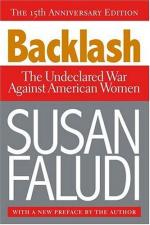|
This section contains 302 words (approx. 1 page at 400 words per page) |

|
Backlash: The Undeclared War against American Women Summary & Study Guide Description
Backlash: The Undeclared War against American Women Summary & Study Guide includes comprehensive information and analysis to help you understand the book. This study guide contains the following sections:
This detailed literature summary also contains Bibliography and a Free Quiz on Backlash: The Undeclared War against American Women by Susan Faludi.
Susan Faludi's bestselling book, Backlash: The Undeclared War Against American Women, is a methodically researched and documented work challenging conventional wisdom about the American women's movement and women's gains in achieving equality in the latter years of the twentieth century. Faludi begins the book by looking carefully at then-current myths about the status of women, including the press reports that single career women are more likely to be depressed than other women, that professional women are leaving their jobs in droves to stay at home, and that single working women over age thirty have a small chance of ever getting married. Not only are these myths not true, says Faludi, but they are evidence of a society-wide backlash against women and what they have achieved in recent years. She describes this backlash as a "kind of pop-culture version of the Big Lie" and declares that "it stands the truth boldly on its head and proclaims that the very steps that have elevated women's positions have actually led to their downfall."
In her book, Faludi takes the press to task for failing to challenge the myths about women in the 1980s and especially for spreading, through "trend journalism," stories about how unhappy women are, despite their having reaped the benefits of women's liberation in the 1970s. Faludi challenges the prevailing wisdom that the women's movement is to blame for women's unhappiness; she believes their unhappiness actually stems from the fact that the struggle for equality is not yet finished.
Faludi uses data from a wide variety of sources, such as government and university studies, newspapers, census reports, scholarly journals, and personal interviews to explore women's status in the 1980s. The personal interviews offer a look at the individuals who are behind the "backlash" and, according to Faludi, are hindering women's progress.
Read more from the Study Guide
|
This section contains 302 words (approx. 1 page at 400 words per page) |

|



